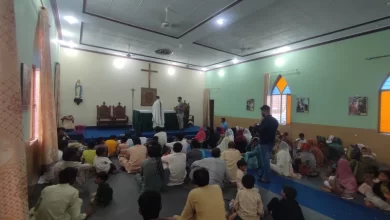New report: More than 50% of people live in a country with serious religious persecution

 Bishop Rolando Álvarez of the Diocese of Matagalpa, Nicaragua. / Credit: Diocese of Matagalpa
Bishop Rolando Álvarez of the Diocese of Matagalpa, Nicaragua. / Credit: Diocese of Matagalpa Washington, D.C. Newsroom, Jun 22, 2023 / 16:15 pm (CNA).
More than half of the global population lives in a country in which state or non-state actors actively persecute people for their religious beliefs, according to the 2023 Religious Freedom in the World report.
The report was released on the first day of Religious Freedom Week, in which the U.S. Catholic bishops have invited Catholics to pray for greater religious liberty both in the U.S. and around the world from June 22–29.
Aid to the Church in Need, a Catholic charity, published the report, which put 28 countries in the “red” category for religious freedom, which denotes religious persecution. Those countries are home to more than 4 billion people and make up about 51.6% of the global population.
The red category includes the two most populous countries in the world, China and India, which the report found to be among the worst religious persecutors. All but one of the countries are in either Africa or Asia. Some of the offenders include Nigeria, Pakistan, Afghanistan, Somalia, Saudi Arabia, and North Korea.
Nicaragua, which ranked in the less severe “orange” category in the 2021 report, has since moved into the “red” category in the 2023 ranking. This was caused primarily by President Daniel Ortega’s persecution of Catholic clergy and religious orders as a means to consolidate power and silence dissent.
“The worst surprise was Nicaragua,” Marcela Szymanski, the editor of the report, told reporters on Thursday, June 22.
In most of the previous reports, states levied persecution against minority religions, but in this case, the state is persecuting a majority religion — nearly three-fourths of the country is Catholic.
The report noted that Bishop Rolando Alvarez, an outspoken critic of Ortega, was arrested, stripped of his citizenship, and sentenced to 26 years in prison for “conspiracy against national integrity and spreading fake news.” More than 200 political prisoners, including priests and seminarians, were charged with “conspiracy” and deported to the United States in February. The state also nationalized a Catholic university and shut down Catholic television and radio broadcasts.
A lot of countries saw worsening conditions for religious freedom over the past two years. The number of countries in the “red” category increased from 26 to 28 since the 2021 report, with Nicaragua and Sudan entering the category. In 23 of the “red” countries, religious persecution worsened since the previous report and, in the other five, the persecution remained about the same. None of the countries saw an overall improvement.
In most of the African and southwest Asian countries, the bulk of the religious persecution is caused by either authoritarian governments or Islamist extremism. In some cases, both are at play. In east Asia, most of the persecution comes from authoritarian governments. In India, Myanmar, and Sri Lanka, the persecution stems from authoritarian governments and ethno-religious nationalism.
The report found an increase in persecution against Muslims in China, India, and Myanmar but also an increase of persecution against Muslims by other Muslims. It also found that forced conversion and sexual violence in West Africa and Pakistan remain largely unpunished, and there is an increasingly muted response from the West.
‘You start with intolerance’
Szymanski said that autocrats, whether elected or not, persecute people of faith when they become “jealous and fearful of the mobilization of any religious leader.” She said in most cases, an autocrat tries to “push them aside or make friends [and] try to co-opt the religious leader.” If unsuccessful, she said this leads to more aggressive forms of persecution.
In some cases, such as Nigeria, Szymanski said autocrats will try to push a religious group into poverty and manipulate census data to effect “the fabrication of a minority that is irrelevant in economic and political terms.” She said this effort was used against Christians in Nigeria, despite the religion making up about half of the country’s population, as a means to facilitate an “Islamization of the country.” She said similar efforts have been used in Lebanon and India to persecute religious groups.
Szymanski also warned against “polite persecution,” which is a term often employed by Pope Francis. In these cases, political leaders avoid the direct sanction of bloodshed but instead turn members of a religious faith into “second-class citizens.” She said this is often employed as a means to improve optics on the global stage.
“It makes it legal to have citizens in your country that have less rights,” Szymanski explained.
The report found that a hybridization of “polite” persecution and outright bloodshed is on the rise. Szymanski said some autocrats will impose laws that infringe on a religious group’s freedom and “look the other way” when there are bloody attacks without openly sanctioning them.
The less severe category, which is the “orange” category, denotes a country in which there is state-imposed discrimination and failing to provide protection or justice for the victims of physical attacks. The report listed another 33 countries in this category, which are home to more than 850 million people.
Szymanski warned that discrimination will sometimes lead to outright persecution, noting that “you start with intolerance.”
“It’s first intolerance, then discrimination, then persecution, and then genocide,” she said.
The “orange” category also included three countries that were not listed in the previous report: Israel, Haiti, and the United Arab Emirates. In 13 of the countries that were rated “orange,” the conditions had gotten worse than they were in the previous report.
Even in countries that did not receive an “orange” or “red” categorization, the report noted that this “does not necessarily mean all was perfect in matters relating to religious freedom.”
The report listed 12 sub-saharan African countries, three Latin American countries, four mainland and maritime Asian countries, one Middle Eastern country, and three European countries as “under observation,” which means that newly emerging factors have been observed that could threaten religious freedom.
Among the countries under observation are Russia, Ukraine, and Belarus. Szymanski said that much of the religious freedom concerns stemming from the Russo-Ukrainian War happened after the researchers compiled its data for this report and that it will be considered in the next report.
The report also highlighted concerns of declining religious freedom in the West, such as hate speech laws, compelled speech, censorship, the rise of cancel culture, and religious freedom restrictions during the COVID-19 pandemic.





